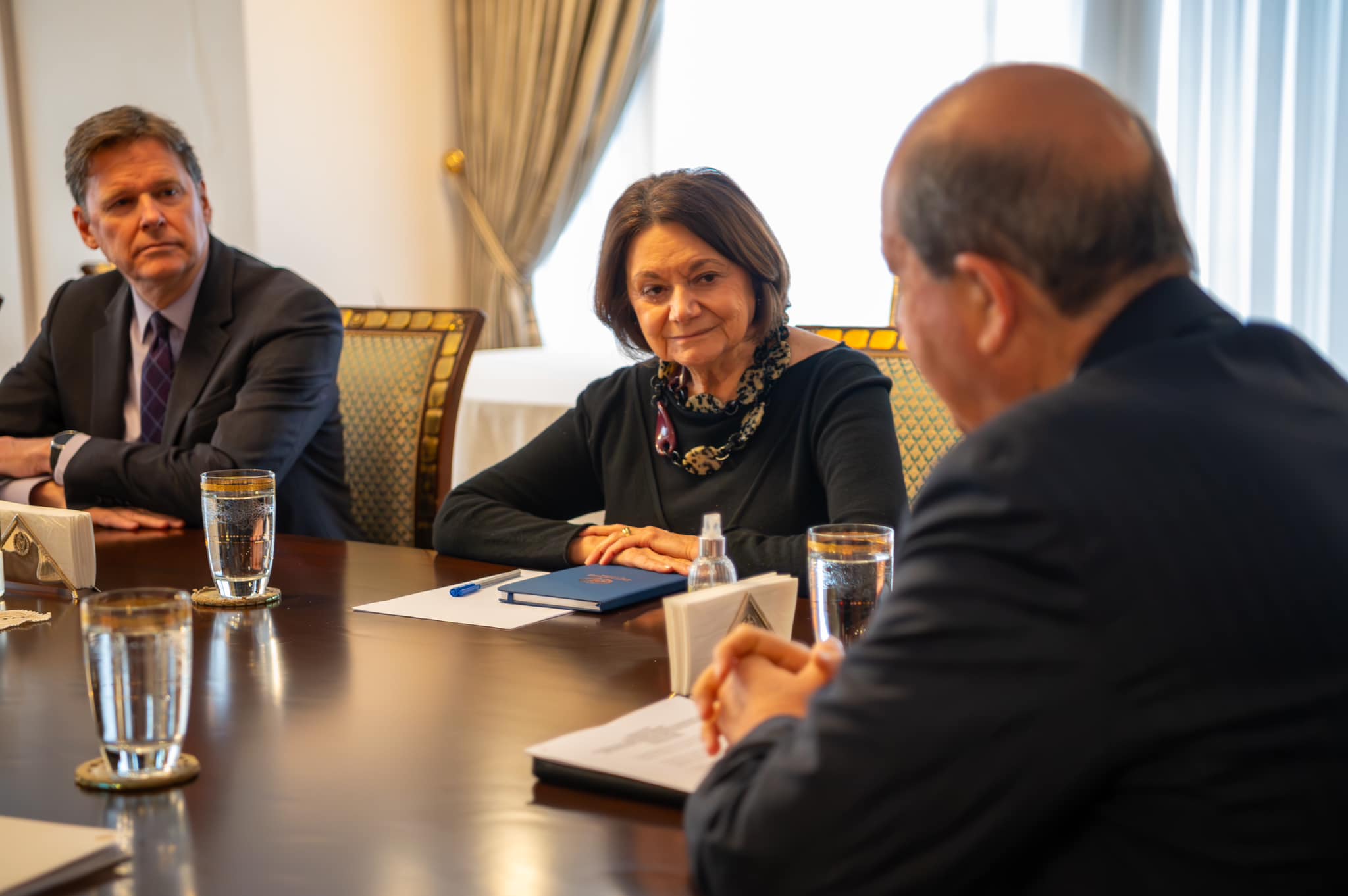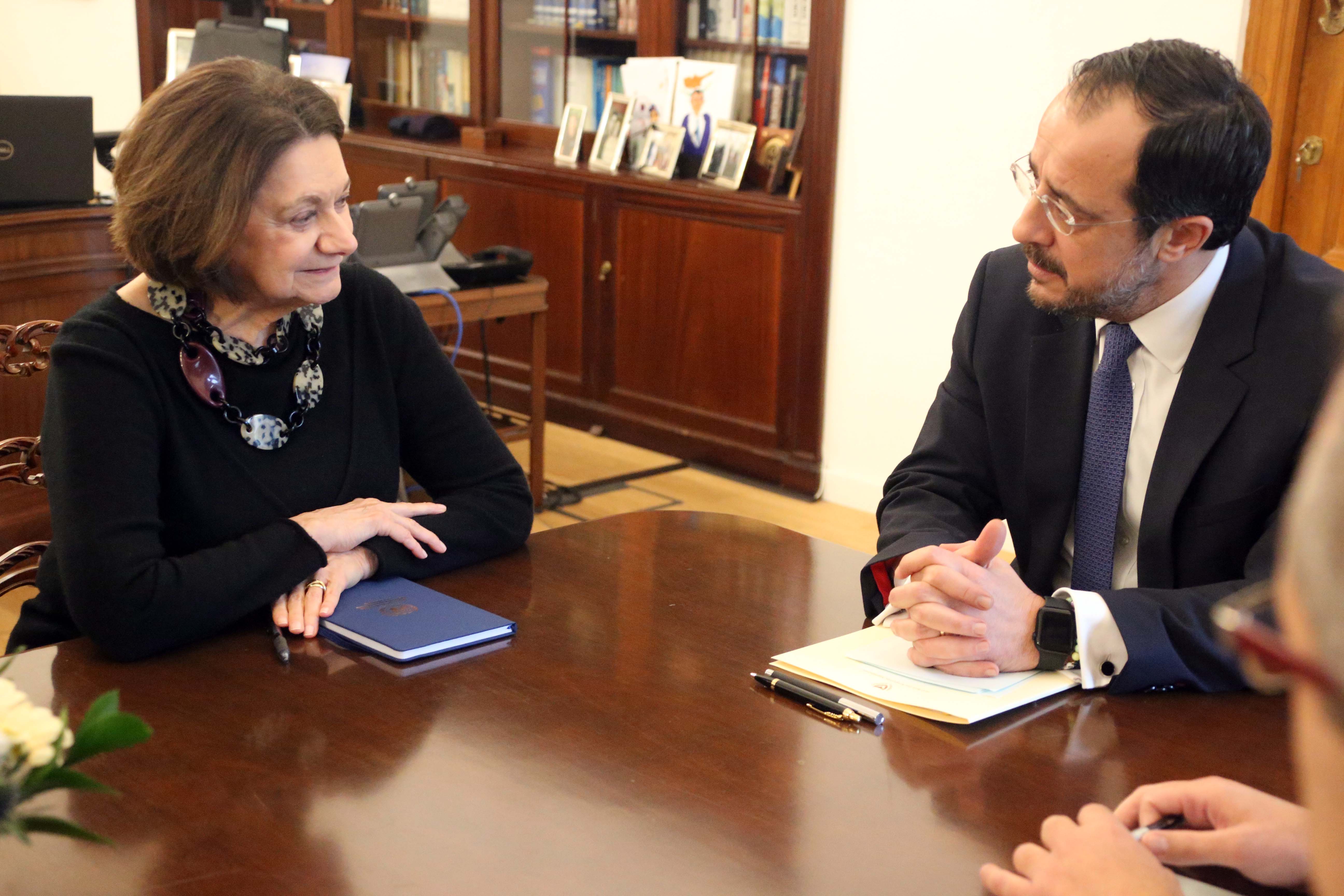An enlarged meeting on the Cyprus problem, involving both the island’s communities as well as all three guarantor powers and the United Nations, will go ahead in the Swiss city of Geneva next month, it was confirmed on Monday.
The meeting was confirmed with UN under-secretary-general for peacebuilding, Rosemary DiCarlo, on the island to meet with both President Nikos Christodoulides and Turkish Cypriot leader Ersin Tatar.
DiCarlo met Christodoulides on Monday morning, and said after that meeting that discussions had focused on preparations “for the meeting in Geneva next month”.
She added that she had assured Christodoulides of UN Secretary-General Antonio Guterres’ “strong commitment … to work with the parties on this issue so that we can move forward”.
Government spokesman Konstantinos Letymbiotis also spoke after the meeting, saying Christodoulides had submitted “specific proposals and suggestions” to DiCarlo over how he believes a “positive outcome” can be secured from next month’s meeting.
He added that Christodoulides and DiCarlo had “exchanged views … on how we should proceed in the period leading up to the multilateral conference, precisely to contribute in the greatest possible way to achieving a positive outcome”.
“We approach this multilateral meeting as an opportunity to serve as a springboard for resuming negotiations from the point where they were interrupted, within the agreed framework,” he said, adding that Christodoulides had “reiterated our readiness once again to resume negotiations”.
He then spoke on the matter of crossing points, saying Christodoulides is ready “even today or tomorrow if DiCarlo’s schedule allows” to hold another meeting with Tatar on the matter of opening new crossing points between Cyprus’ two sides.
He added that DiCarlo had informed Christodoulides that she would travel to both Ankara and Athens to meet representatives of both the Turkish and Greek governments, and that they will “be in touch” after the conclusion of those meetings.
Letymbiotis and DiCarlo had not announced a date for the meeting, but Tatar after his meeting with DiCarlo earlier in the day had said the meeting would take place on either March 17 or March 18.

He reaffirmed his stance on the prospect of negotiations, saying that the “sovereign equality and equal international status of the Turkish Cypriot people must be accepted” for there to be “constructive steps to be taken towards a solution”.
“The Turkish Cypriot people are the primary element in Cyprus and have an inherent right to sovereignty, and I conveyed those vital rights at the meeting,” he said.
He added that he had told DiCarlo that the Turkish Cypriots’ international isolation constitutes an “unjust punishment”, and said, “we will never accept an agreement they force upon us by making our lives difficult”.
“Importance should be given to the Turkish Cypriot people’s sensitivities and what has been happening on the island for 60 years for a fair, permanent, and sustainable agreement to come about. The Greek Cypriots rejected every agreement, but the Turkish Cypriot people are living under embargoes, and this is unacceptable,” he said.
On this matter, he called on the UN to “take steps”, including the opening of direct flights to the north from countries other than Turkey, as well as direct contact and direct trade.
He then said Cyprus’ two sides “could cooperate on many issues”, including crossing points, energy and tourism, before turning his attention to the issue of crossing points.
“There could be cooperation on the crossing points, which were also concerned at the trilateral meeting in New York. There are nine crossing points at present, but Ayios Dhometios carries the weight of 65 per cent of crossings,” he said.
He added, “Ayios Dhometios can no longer handle this and is causing trouble for both sides, and we made a proposal to open new crossing points in Mia Milia and Louroujina but did not receive a response.
“The Greek Cypriot side went outside the framework and wanted transit passages between different parts of the south, and it was not possible to accept this,” he said.
The enlarged meeting in March will see both Cyprus’ sides as well as representatives of the island’s three guarantor powers, Greece, Turkey, and the United Kingdom, and the UN, convene to discuss the Cyprus problem.
Tatar has remained insistent that the UK play a “lesser” role in the meeting, having previously publicly been against the idea of British involvement, before agreeing to a “4+1+1” format, with the “four” being the Turkish Cypriot and Greek Cypriot communities and Turkey and Greece, and the two “plus ones” being the UN and the UK.
He also insisted that negotiations on the basis of a federal solution to the Cyprus problem must not happen.







Click here to change your cookie preferences